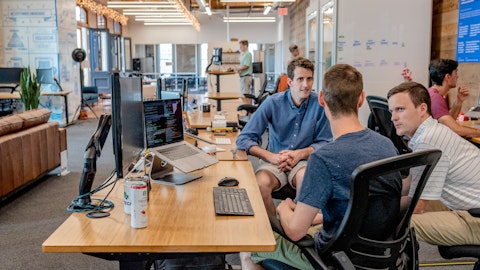Joe Greff: Good morning, everybody.
Tony Capuano: Good morning.
Joe Greff: Tony, can you talk about what’s going on with pipeline signings in China presently? And how much of a, I guess, of a disruption, whether it be in the first quarter given what’s been going on there? And then when you look back at the fourth quarter, and the development pipeline was down a little bit sequentially. There have been quarters in the last 4 years, where it’s down sequentially. It doesn’t mean anything necessarily. How much of the sequential pipeline in the fourth quarter was explained by disruption in China signings?
Tony Capuano: Sure. Maybe I’ll take the second question first. The pipeline tends, as you well know, to ebb and flow quarter-to-quarter. The statistic I look at related to pipeline that I think is a bit more telling is the 2% year-over-year increase in the pipeline. Obviously, deals come in and out of the pipeline in a year where nearly 30% of our openings were conversions. We’ve talked in the past about the fact that some conversions never even make it into the pipeline. They get signed and opened quite quickly. On your first question about China signings, China signings last year were down about 15% from where we were in €˜21. And they were down a little more than third from where we were in €˜19. As the borders open, we expect to see meaningful positive impact certainly on demand patterns, but also on the health and the outlook of our development partners. And so we would expect an acceleration in deal volume.
Leeny Oberg: And Joe, the only thing that I’ll add is there was the obvious challenges for opening hotels in China tied to the shutdown in China that impacted permits and getting the teams trained and up and running. And so from that respect, we certainly saw a few drift from where we had expected them opened in Q4 to open in Q1. And I think that was clearly to be expected as they saw the shutdown continue. But again, as things open up, we look forward to them increasing.
Joe Greff: Thank you.
Tony Capuano: Thanks. Joe.
Operator: And we will take our next question from Robin Farley with UBS.
Robin Farley: Great. Thanks. My question is on the unit growth outlook, and there is some acceleration embedded in there. You mentioned China, obviously, is one of the drivers of that. And I guess the City Express acquisition. So just wondering if you have any other acquisitions in that unit growth guidance, just to clarify that?
Tony Capuano: We do not.
Robin Farley: And then €“ okay. Great. Perfect. Thank you. And then my other question was on City Express because you’ve talked about using that to grow in other regions. And I’m curious you haven’t mentioned potentially using it in the U.S. There are others out there sort of looking to grow units in the more limited service segments in the mid-scale and economy segments, and that hasn’t been a big focus for Marriott. I’m just curious if you have any thoughts on those segments, and then also sort of why or why not use of this new brand that is more €“ is further down the chain scale and some of your other brands in the U.S. market as well? Thanks.
Tony Capuano: Of course. So we are very excited to get over the finish line with City Express. As we outlined, when we announced our intent to acquire Citi, it represents our entry into the mid-scale segment, which is very exciting. It increases our portfolio significantly in the important and growing CALA region. We expect to grow that brand aggressively across CALA, and we are €“ as we move towards closing that transaction, evaluating the applicability of that brand in other markets around the world. We’ve not made definitive decisions about when and if we will roll out City Express in other places, but you can rest assured those evaluations and discussions are going on as we speak. I do think if you look at our historical track record of acquisitions, many of those acquisitions initially either strengthened our leadership position or gave us a meaningful foothold in a region where we weren’t growing as quickly as we’d like organically.
And then over the passage of time, we look for opportunities to grow that platform more broadly. And I think the same strategy will apply to City Express.
Robin Farley: Great. Thank you. And just one quick follow-up, if I could. Just €“ is there anything you would call out with termination fees? Is it a big part of the growth in that line item? How is that compared to termination fees for pre-pandemic? Or just anything going on there that you would call out? Thanks.
Leeny Oberg: Sure. Nothing in particular. They do vary. They can be something related to one hotel or a particular transaction, but they vary. We’ve talked about them before, Robin. It’s kind of varying anywhere from $20 million to $40 million in a particular year. And as you saw from our deletions number, apart from Russia, we’re really absolutely quite where we typically are. So there is nothing particular in that number.
Robin Farley: Great. Thank you very much.
Tony Capuano: Thanks.
Operator: We will take our next question from Richard Clarke with Bernstein.
Richard Clarke: Hi. Good morning. Thanks for taking my question.
Tony Capuano: Good morning.
Richard Clarke: The first one is on the incentive fees. The incentive management fees seem to have recovered about 10% quicker than the base management fees. And in the past, you’ve talked about whether that’s a small number of hotels paying a lot of incentive fees or whether that’s becoming a sort of more broad-based increase in profitability. So just wondering maybe you could comment on what’s sort of supporting the outperformance of the incentive fee?
Leeny Oberg: Yes, sure, absolutely. So just €“ while Q4 was spectacular, and we really had a wonderful performance in our incentive fees. The reality is they are still meaningfully lower than they were in 2019, while the rest of our fees have grown quite nicely, our basin franchise fees as rooms have grown, RevPAR has recovered as well as the non-RevPAR fee growth has increased. So when you look at IMF as a percentage of total fees compared to €˜19, they have actually gone down. And we would expect them to continue to be a little bit lower than they have historically been. And they do, obviously, reflect a little bit riskier fee stream for us than comparing to the classic base in franchise fees. But when you look at kind of where we are in terms of hotel’s earning incentive fees, I think there are a couple of interesting statistics.
And that is that in €˜22, 61% of our managed hotels earned an incentive fee that compares to 72% in 2019. And in the U.S., 39% of our full-service hotels earned an incentive fee versus 45% in 2019. And I break €“ I don’t include MSB because there is a very big difference in the managed limited service hotel portfolio between €˜22 and €˜19, so it’s not as relevant a number. And as you know, many of our Asia Pacific incentive fees are not back to €˜19 levels as a result of their RevPAR recovering a bit later than the U.S. So I think we’re thrilled with the performance of our operating team, very proud of the work that they have done, especially given wage increases. And I think to one point that you’re raising; we’re excited about what we see in €˜23 and the years ahead for the IMF potential for our hotels.
Richard Clarke: Okay. That’s great. Just a quick follow-up to someone’s question earlier, they refer to acceleration in the net unit growth. If I did the math right, it looks like you did 3.6% ex-Russia exit in 2022, and that drops down to 3.5% ex-City Express in 2023. So is that correct? And if you’ve got some China hotels moving into this year, where is that slowdown coming from?
Leeny Oberg: Well, again, I want to make sure we certainly include City Express. When we think about our rooms growth, that’s a very important component of how we think strategically about how we’re growing around the world. So when I think about accelerating rooms growth that is a part of it. And then when I think of the timing, we’ve clearly got the reality that construction starts over the past couple of years in the U.S. are having an impact in €˜23, in particular, in the U.S. for room openings. But again, otherwise, with the signings that you heard Tony talking about, we’re very enthused about what we see going forward and then conversions have been a big component as well.
Richard Clarke: Understood. Thanks very much.





